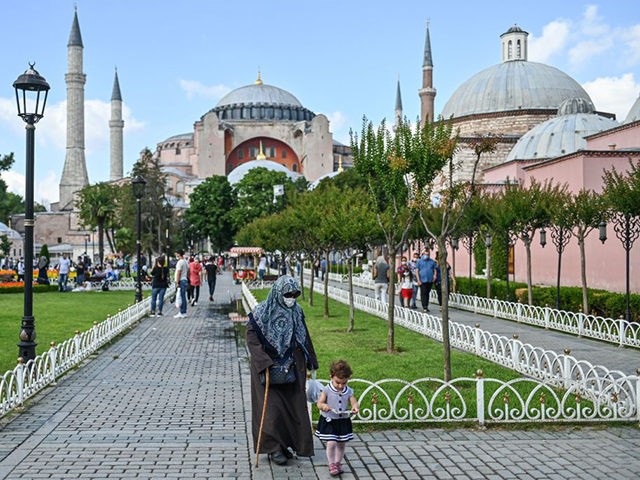Turkey’s Religious Affairs Directorate (Diyanet) announced in a Tuesday statement that it would cover up images of the Virgin Mary and Jesus Christ in the Hagia Sophia, one of the holiest sites in Christianity, now that it has been converted into a mosque.
Islamist President Recep Tayyip Erdogan announced the conversion of the Hagia Sophia last week, boasting in a Turkish-language statement that the conversion would bring the Muslim world one step closer to controlling the Temple Mount in Jerusalem. Built as a Christian cathedral during the Roman-Byzantine era, the Hagia Sophia was converted into a mosque after the 1453 conquest of Constantinople and later made a secular museum under Mustafa Kemal Atatürk.
The Hagia Sophia conversion has alarmed both Christian leaders and political ones, including the United Nations, which expressed concern for the status of the building given its designation as a UNESCO World Heritage Site.
The Diyanet now officially administers the Hagia Sophia given its official status as an Islamic building.
In an attempt to address concerns, the Diyanet issued a statement asserting that the Hagia Sophia’s new status as a mosque would result in improved maintenance because Islam demands heightened cleaning and restoration of religious sites. In doing so, however, it revealed that some of the most important priceless art in the building — Christian frescoes painted for its use as a cathedral — will be covered up so as not to offend the sensibilities of Muslims as they pray. Islam is largely an iconoclastic religion, avoiding visual depictions of religious leaders and spiritual beings. While the Virgin Mary and Jesus Christ are mentioned in the Quran and Jesus is considered an Islamic prophet, images of them may offend Muslims during prayer.
“Opening of Hagia Sophia as a mosque was met with great pleasure by our people, and the whole Muslim world. Muslims will always cherish those who made it happen,” the Diyanet statement read, according to Turkey’s state-run Anadolu news agency. “Paintings, frescoes in Hagia Sophia are no obstacle to praying in there. In order for Muslims to pray with serenity, these frescoes should be covered with curtains or darkened with the help of black lights.”
“The icons should be curtained and shaded through appropriate means during prayer times,” the statement continued. “There is no obstacle from a religious perspective to Hagia Sophia Mosque being open to visitors outside prayer times.”
The statement did not clarify if the frescoes would be visible outside of prayer times. Muslims are commanded to pray five times a day.
The Diyanet did emphasize, as Ankara has been attempting to do since the announcement of the conversion, that the Hagia Sophia would not turn away people of other faiths if they want to visit outside of prayer times and if they dress “appropriately,” meaning that they follow Islamic guidelines of modesty.
“In Islam, physical and spiritual wellbeing of mosques are a responsibility for all Muslims (Holy Qur’an, Surat al-Tawbah, 9/18). They should be kept clean, taken care of, and used as a place to worship Allah only, and to be filled with worshippers all the time (Holy Qur’an, Surat Jinn, 72/18),” the Diyanet said. “For that reason, it is upon all Muslims to ensure the physical and spiritual wellbeing of Hagia Sophia, a gift to us from our forefathers.”
The emphasis on keeping the cathedral’s doors open to non-Muslims reflects Erdogan’s assurances in an English-language statement on its conversion to a mosque last week.
“Hagia Sophia’s doors will be, as is the case with all our mosques, wide open to all, whether they be foreign or local, Muslim or non-Muslim,” Erdogan said in English. His Arabic-language statement, however, applauded the conversion as a victory for Islam over other religions and a threat to the stability of Israel. Erdogan insisted that converting the Hagia Sophia would help bring “the return of freedom to al-Aqsa,” the Jerusalem mosque in Israeli-controlled territory.
Erdogan has spent years trying to convert the Hagia Sophia into a mosque, thwarted at times by Turkey’s court system. Erdogan allowed an Islamic call to prayer from the building for the first time in the history of the Republic of Turkey in 2016, thus allowing Muslims to use it for Ramadan prayers. The first prayers there occurred a week before secularist members of the military attempted, and failed, to overthrow Erdogan in a coup that year.
Erdogan personally recited prayers there on Easter weekend in 2018.
The Hagia Sophia’s conversion prompted alarmed statements from all over the world and a rare moment of agreement between American and Russian diplomats.
“The Government of Turkey has administered the Hagia Sophia as a museum — officially recognized by UNESCO as part of the Historic Areas of Istanbul World Heritage Site — in an outstanding manner for nearly a century,” Secretary of State Mike Pompeo said in a statement last week. “We urge the Government of Turkey to continue to maintain the Hagia Sophia as a museum, as an exemplar of its commitment to respect the faith traditions and diverse history that contributed to the Republic of Turkey, and to ensure it remains accessible to all.”
The Russian Foreign Ministry similarly lamented the move.
“We regret the decision of the Turkish Republic’s leadership on turning Hagia Sophia cathedral-museum into a mosque and resuming Muslim religious services there,” Foreign Ministry spokeswoman Maria Zakharova said. “We expect that any steps against this unique monument will take into account its unique importance for believers of the entire world.”

COMMENTS
Please let us know if you're having issues with commenting.